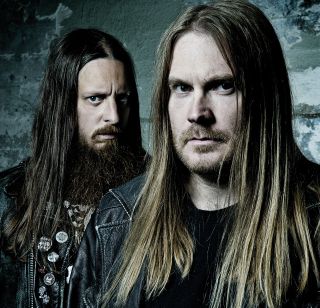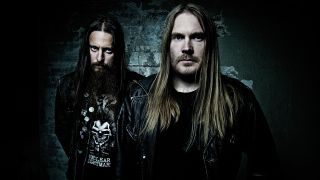There should be some sort of psychological test, looking at the effect of people talking about themselves all the time. Because that’s what people are asking you to do. I went from being a person that never said no, to being someone who has to say no… The pressure is immense. You just want to stay at home and not leave the house.”
Speaking from the cosy confines of that very home, Fenriz is once again neck-deep in promo hell. While he has sworn never to match his unenviable record of 104 interviews – conducted to promote previous Darkthrone opus The Underground Resistance – he could probably double it if he wanted to, such is the demand to speak to him right now.
Not only is he handling discussions of the new album Arctic Thunder alone but to make matters worse he’s currently caught up in a media storm following a surprise – and somewhat reluctant – election as a party representative in his hometown of Kolbotn.
“There’s now this extra media pressure because of the political thing and that’s unfortunate because I’m not wanting to become a celebrity at all,” he sighs. “As a matter of fact, I’m trying to keep a low profile, because I travel by public transport and if you get too well-known then that becomes impossible, as people want to talk to you.”
Turns out that Fenriz isn’t particularly enthusiastic about talking about himself and certainly not his civic duties at the local council. What he wants to talk about is music – just not necessarily his own. Indeed, alongside his roles as a musician and politician, the drummer has comfortably added that of ‘curator’ to his CV in recent years.
When not handling his civic duties and making music, he is directing his followers towards artists of all stripes via his ‘band of the week’ page (picked up most notably by the Live Evil festival, who fill their events with recommended bands), his Soundcloud radio show and also freelance work as a music journalist. As he admits, such analysing and research puts him in a somewhat unusual position when it comes to discussing his own work.
“Now when I’m talking about my songs I’m trying to do the interview – internal view – first, looking at the songs from the inside,” he explains. “But at the same time I’m a music journalist, so I can listen to the finished tracks of mine and then tell you what I hear, that it sounds like an old Exodus riff or Metallica riff and so on.
"Every riff has some sort of origin story. Ted [Skjellum] does not want to talk about his songs at all, I have to talk extra, because if I didn’t it would be a really boring interview. Or it would be a really great interview where I talk about other stuff.”
Tellingly, both members write their halves of each album alone, and the fact that the band don’t play live means the songs don’t go through a process of changing organically over time during performances. Nor are they worked on in the rehearsal room and, as it turns out, there is almost nothing done to the compositions once written save for teaching them to each other and recording them for posterity.
Spontaneity certainly seems to have been a defining aspect in Darkthrone’s music in recent years, and such an approach explains why their songs sound intuitive and stand a mile away from the many polished extreme metal recordings out there.
“The process for us is that we learn them, we play the same song like four times, then start recording,” states the drummer simply. “It usually takes one hour or half an hour until we learn each song and then we record. Sometimes we are not understanding each other’s riffs, but it doesn’t usually happen. And I never direct Ted’s vocals on the songs I write or even know what they will be like until he is done.”
- The 10 best songs from Darkthrone drummer Fenriz's radio show
- Darkthrone album review – Arctic Thunder
- Darkthrone: The Underground Resistance
- Darkthrone's Fenriz involuntarily voted into his town council
For the new album, Ted (aka Nocturno Culto, for anyone not aware) actually handles all vocals, not only his own songs but those written by Fenriz. It definitely gives a more unified feeling but it’s surprising to find how independent the two have become after so many years playing together, Fenriz seemingly now the more considered composer and Nocturno the more intuitive.
“I can’t speak for Ted here,” the drummer admits. “I imagine that he always just makes music from his own head – but that would be pure guesswork on my end. I, on the other hand, had a vision for this album.
"We were very pleased with The Underground Resistance and I was wondering how to top it. That album was some kind of mammoth for us and it was hard to deal with the fact that we would either have to kill that mammoth or go around it.
"The latter was chosen and I opted to shave away some more styles. I understood that, OK, it’s time to sacrifice my need to sing, sacrifice those beautiful speed metal songs à la Sweden 1983-1985. So what was there for me to make? Slow heavy metal.
"When I decided to try for another album, I had four other albums in mind as inspiration: Dream Death’s Journey Into Mystery, Sacrilege’s Within The Prophecy, Black Sabbath’s Mob Rules and Candlemass’s Epicus Doomicus Metallicus. This doesn’t mean that I’ll sit down and listen to them and try to copy anything, it’s more like a road map.”
That’s the internal insight covered. But with his music journalist’s hat on, how does Fenriz objectively evaluate the final work?
“After I was given a copy of the recorded album from Ted, I discovered that there was, for instance, nothing on my songs that reminded me of Candlemass – so you can see that I’m not working like a robot. However, there are riffs on my songs that have the feel of the other three albums, and also some Iron Maiden, Hellhammer, early Exodus, Autopsy, Necrophagia circa 1987 and so on.
"What I’m really trying to write is what I would’ve written in 1988 if I, firstly, had had the writing skills and drum experience back then and secondly, if we didn’t go into more death metal territory in late 1988/early 1989.
"What I am writing is the real original Darkthrone music, back to the real roots. It always says in biographies online that we started out as a death metal band, but listening to our first demo it’s clear to everyone that we didn’t. We had all sorts of inspirations that were way older than that.”

So what is the end result of the two musicians’ creative impulses? Ultimately a solid album that slots comfortably beside the band’s recent works thanks to its loving and gutsy combination of classic 80s metal influences.
In fact, the only people likely to be surprised by it are those who misunderstood the online comments about going back to the roots and assumed, with utmost wishful thinking, a return to tech death metal à la 1991’s Soulside Journey or classic Norse black metal à la 1992’s A Blaze In The Northern Sky.
The shift from drawn to photographic cover art also misled a fair few folk, the combination setting message boards alight with speculation. Still, despite not having reinvented the band dramatically since The Cult Is Alive one decade ago, it’s clear that Fenriz is determined to keep the band’s music gently evolving.
“This comes up with almost every album,” he concludes, “but especially this album. We can talk about it in different ways; we can talk about it as though we are running the ‘Darkthrone Restaurant’ and then Ted has the 50% part of the menu that is the ‘steady menu’, because if you change the menu all the time, people will stop coming, right?
"And then I’m the creative guy who changes things up and mixes it around, because I have a sudden need to not get stuck and I get tired of doing what I do really quick. I think it is good that I entered further into the role of journalist because it gives me almost total oversight and so I tend to go where most people aren’t perhaps, so that I will have some sort of impact. But then it gets crowded again and I ask what are people not doing?”
Darkthrone's latest album Old Star is out now via Peaceville.

